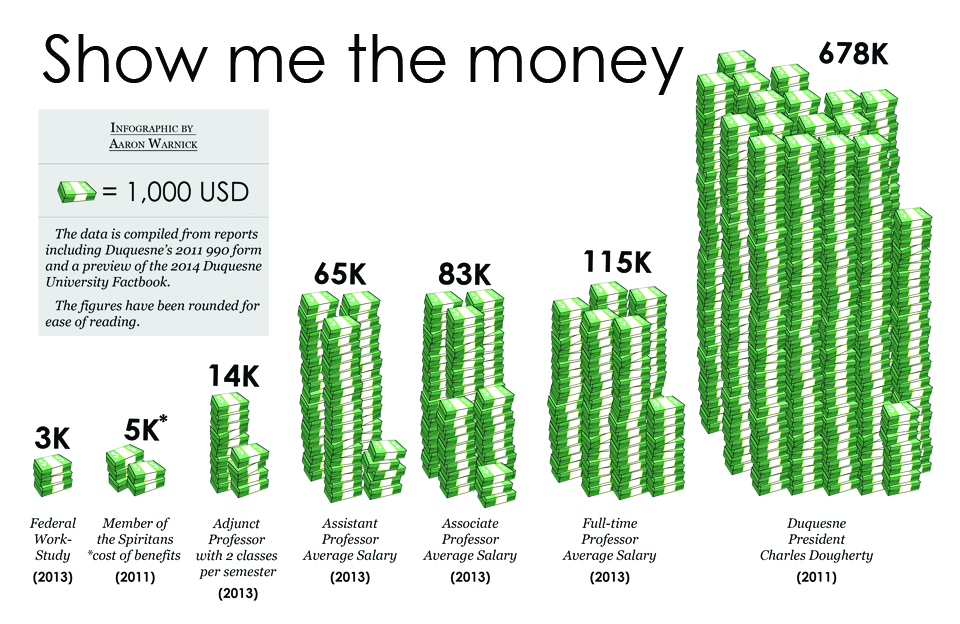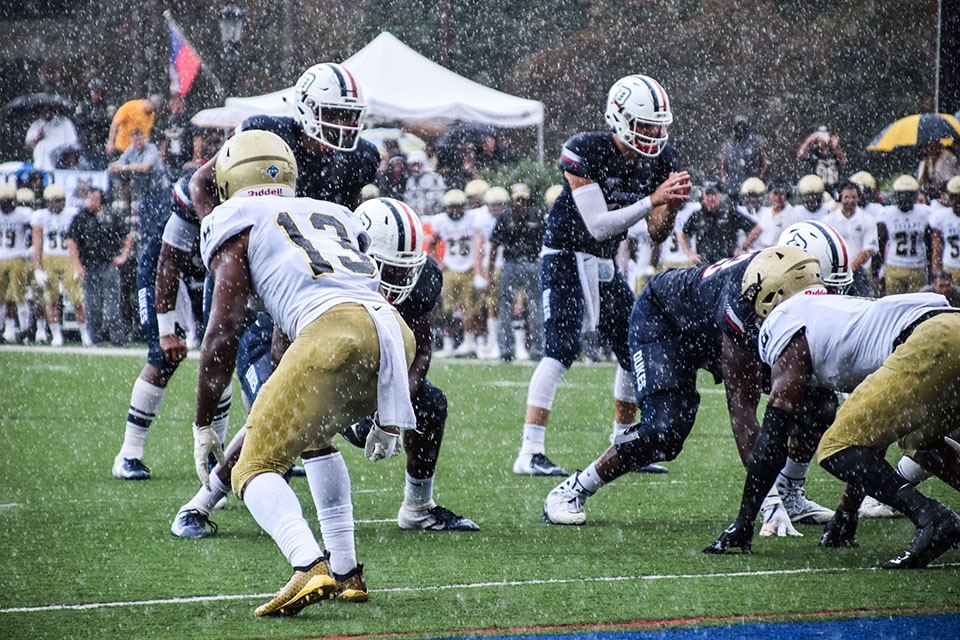

By Julian Routh and Brittney Jackson | The Duquesne Duke
Duquesne University President Charles Dougherty is among the top 100 highest paid presidents of private institutions in the country.
Dougherty, who is the 97th highest paid, made $678,893 in 2011, according to a Chronicle of Higher Education report of the latest endowment data available. The outlet gathered 2011 salary information from 550 chief executives at 500 private nonprofit colleges in the United States.
Comparisons of Dougherty’s 2011 salary vary. According to the Chronicle report, Dougherty made the most among presidents of similar institutions in finances and student demographics. He was paid $131,708 more than the second highest president, John Garvey of Catholic University of America. The median pay for presidents in the group was $361,988.
Still, among his private school Atlantic 10 peers in 2011 he was outranked by George Washington’s Steven Knapp, $1.1 million, and Richmond’s Edward Ayers, $836,289.
Dougherty by far took home the heftiest paycheck on the Bluff, raking in $210,449 more than then- men’s basketball Coach Ron Everhart. His pay was also more than five times the median salary for full-time professors at the University in 2011. From 2008 to 2011, his salary increased by nearly $45,000.
The salaries of university presidents have come under increasing scrutiny in recent years as tuition costs have risen steadily, saddling students with tens of thousands of dollars of debt upon graduation. The average tuition at Duquesne has risen from $27,502 in 2011 to $31,385 in 2014.
According to an annual report by the American Association of the Universities Professors, the average college president got a raise ranging from 7 to 22 percent from 2007 to 2013. Faculty data from over 600 schools revealed that the most senior professor salaries increased less than 5 percent during the same time period.
According to John Curtis, director of research and public policy for AAUP, schools need to invest more money into the core academic mission of higher education.
“What we need to do is use a greater proportion of the money and spend it on the academic program,” Curtis said. “But it’s not necessary that we have to increase spending overall. We’re talking about a redistribution of the spending.”
Dougherty, 64, is currently visiting Duquesne’s campus in Ireland. His office and Duquesne’s Board of Directors, which decides how much the president makes, referred comment to the public relations department.
Duquesne spokeswoman Bridget Fare said Dougherty’s salary is based on his performance. Since he took the job in May 2001, the University has seen “unprecedented enrollment growth, an increase in the academic credentials of our student body, increased selectivity, the most successful fundraising effort in Duquesne’s history and numerous national recognitions.”
“These achievements have not only strengthened the University for the present, they also ensure its reputation and success for the future,” Fare said. “A president’s overarching responsibility is to ensure the long term viability of the institution, which affects students, their families, employees and alumni.”
Nicholas Cafardi, president of the Duquesne Faculty Senate, declined to comment about Dougherty’s salary. The Senate is the official voice for campus faculty, with the main concern that faculty be fairly compensated, Cafardi said.
“That’s always a major concern,” Cafardi said. “Last year the faculty pool for raises was 4 percent. That was better than most other universities.”
Peter Samson, president of the Student Government Association, said he assumes being president is “no easy task”.
“Personally I think being president of any university is no easy task that most people are either unwilling to take on or unsuitable and therefore being a high-paying job,” Samson said. “Additionally, I think that Duquesne’s growing reputation and national recognition speaks for itself, lots of which I’m sure is credited to President Dougherty’s work.”
From 2003 to 2013, the average salary of full-time faculty at the University increased annually by 4.2 percent, according to a report from the Office of Institutional Research and Planning. The average salaries of associate and assistant professors both saw a 3.2 percent annual increase over the 10-year period.
Dougherty’s salary came under fire from union organizers from the United Steelworkers last year as they pushed adjuncts to vote in favor of organizing. The average adjunct now makes $3,500 per course.
Dougherty’s contract is up in 2016. The board voted unanimously in 2008 to put five more years on his contract, which was to end in 2011.
The Rev. John Sawicki, a member of the board, told The Duke in October 2008 that the board was enthusiastic to extend Dougherty’s contract.
“The list of university presidents [across the nation] is slim,” Sawicki said. “You want to make sure you keep your best talent at home.”




